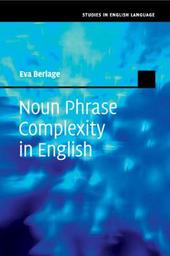
|
Noun Phrase Complexity in English
Paperback / softback
Main Details
| Title |
Noun Phrase Complexity in English
|
| Authors and Contributors |
By (author) Eva Berlage
|
| Series | Studies in English Language |
|---|
| Physical Properties |
| Format:Paperback / softback | | Pages:298 | | Dimensions(mm): Height 230,Width 151 |
|
| Category/Genre | Grammar and syntax |
|---|
| ISBN/Barcode |
9781108790420
|
| Classifications | Dewey:425.5 |
|---|
| Audience | | Professional & Vocational | |
|---|
| Illustrations |
64 Tables, black and white; 31 Halftones, black and white; 47 Line drawings, black and white
|
|
Publishing Details |
| Publisher |
Cambridge University Press
|
| Imprint |
Cambridge University Press
|
| Publication Date |
12 December 2019 |
| Publication Country |
United Kingdom
|
Description
This book explores noun phrase (NP) complexity in English, showing that it is best accounted for both by a linear and a hierarchical parameter: its length and its type of postmodifier(s). The study is methodologically unique in that it combines univariate and multivariate analyses in an investigation of four different syntactic variables. Drawing on more than three billion words of British and American data, Eva Berlage shows that the length and the structure of the NPs, along with language-external factors such as the regional variety of English, work as powerful determinants of the variation. On a theoretical level, the book reveals that the structural complexity of NPs cannot be sufficiently captured by (phrasal) node counts but that we need to incorporate the degree to which NPs are sentential. The book is designed for researchers and students interested in syntax, language variation, sociolinguistics, structural complexity and the history of English.
Author Biography
Eva Berlage is Junior Professor of English Linguistics at Universitat Hamburg.
Reviews'Noun phrase complexity, syntactic weight, and related notions take center stage in the empirical literature on grammatical variation. Berlage's systematic and comprehensive study is required reading for all those who are in the business of measuring and interpreting these things.' Benedikt Szmrecsanyi, Katholieke Universiteit Leuven
|